Vaccines against peste des petits ruminants virus
Peste des petits ruminants (PPR) is an acute and highly contagious viral disease of sheep, goats and wild ruminants. The disease is controlled by the use of live-attenuated vaccines that give a lifelong immunity. Currently, several PPR vaccines are available for use in the field that are based on the tissue culture passage attenuation of wild-type PPR isolates. Four such preparations, viz., PPRV/Nigeria/75, PPRV/Sungri/96, PPRV/Arasur/87 and PPRV/Coimbatore/97 are licensed for use. The PPR vaccines comprising of PPRV/Nigeria/75 and PPRV/Sungri/96 are commercially available. While highly efficacious, a drawback to these vaccines is the requirement of a cold chain to preserve vaccine titre in the field. Thermostable live-attenuated vaccines have recently been developed in an attempt to circumvent the problems associated with the maintenance of a cold chain in tropical and subtropical countries. Despite this issue, targeted vaccination programmes for PPR in high-risk populations of sheep and goats constitute an effective control strategy. Lessons learnt from the rinderpest eradication programme suggest that the availability of a DIVA vaccine, to enable the differentiation between infected and vaccinated animals (DIVA), and a companion diagnostic test would greatly aid both the control and the surveillance for PPRV although it is recognised that eradication could be achieved in the absence of these tools. In this chapter, we discuss both the current and potential future vaccine strategies for PPRV and highlight elements of vaccines that are highly desirable in newer vaccine preparations.
